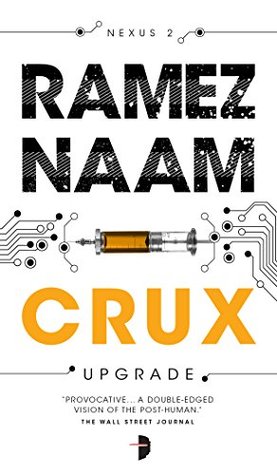My review of Nexus by Ramez Naam, a near future cyberpunk novel with strong thriller elements and themes that explores augmentation and transhumanism. If you like science fiction that takes the implications of the technology it introduces seriously and want to spend more time in a non-western setting, then Nexus is really a great choice. You will also find the review of the secual Crux here.
My review of Nexus & Crux
My review of Nexus by Ramez Naam
Nexus is a book that force you to think. It is thought provoking. I do not think you can read this book and not think about the issues it raises. Not just that, it is also a great read. The book explores the implications of the technology in deep – the good and the bad.

My review of Nexus from 2014
Title: Nexus
Author: Ramez Naam
First book in the Nexus Series
Genre: Cyberpunk, near future science fiction
The concept and plot
The main concept of the book Nexus for those of you have not read the blurb is that they have developed a nano-drug, Nexus, that lets your brain communicate directly with other brains on the drug. It lets you share information and emotions from one brain to another. That is the premise of the book. Which I find extremely interesting. While writing and reading can be a form of telepathy enabled by the written word, this is so much more powerful and less edited than the now thousands of year old enhancement of our brain.
One of the things I appreciated in Nexus is that Naan allows the examination of the implication of the Nexus technology to get messy and complicated. He shows us a lot of very good, bad and in between possible consequences. He does not take the easy way out and come down unconditionally on one side of the issue, which makes it into an interesting book. There are rarely easy answers to weather a new radical technology is good or bad. Most of the time it just provides possibilities and humans will do many things with it.
I love that Naam understands and shows that you can’t just ban technology, it isn’t practical or really possible. Not for long anyway. Once a technology, an idea or an innovation has been discovered it means that all the pieces needed to make that leap is already present in the world of ideas. You might assassinate/disappear/imprison the scientist working on the project and burn all the notes. That might halt a innovation, but in a world where information is mostly accessible it is possible for someone else to make the same discovery. There is a reason so many technologies are developed not once but multiple times at around the same time – not only in present day, but throughout history. The telephone, writing, agriculture just to name the simultaneous inventions that come to mind. This is something they do not seem to get in Hollywood. You can’t just shot an idea.
I loved that the knee jerk reaction of clones are evil and dangerous that the protagonist has is disputed quickly. Clones really just twins. They might be genetically engineered twins as is the case here, but really they are just identical twins. Nothing more, nothing less.
About halfway through the book I realised that I was probably more interested in the tech, the moral dissections and the what-if-questions than I was in the plot of story. Towards the end of the book there is a long action scene followed by a chapter of a hacking battle and I found the hacking battle way more entertaining than the actual battle. This is not to say that the story isn’t interesting or that the action scenes are boring. It just find the science issues more interesting. The book overall was very enjoyable, do not get me wrong!
The characters
While the ethnic diversity of the novel is very good – there are a lot of non-white, non-american characters – the gender-breakdown is not impressive. For every 3-4 male characters, both in leading and supporting and background roles, there is one woman. Which I find is ashame.
Naam is however doing the same interesting thing as Fringe, where our female protagonist is the one who get to be the action hero. She is extremely competent at her job, nobody is very threatened by that (that includes Kaden – the male protagonist, which by the way makes him way more likeable), Sam gets to rescue Kaden over and over. Kaden is often powerless faced with physical threads. Kaden however gets to be a great scientist and a really competent hacker. So Naam you are forgiven for the lack of women because the woman who are there are awesome. I am however a bit worried that that might not be better in book two.
I appreciated that the big-bad-agency tries to convert Kaden (the male protagonist) to their way of thinking, not just blackmail him. It is a way more efficient tactic in the long run and definitely worth their time. I love that we get to understand the position of the agency and of Samantha Cataranes (Sam), the female protagonist. They are not just the big-bad-agency. They have good reasons for doing what they do. Their means might be way out of line, but at least their goal make sense.
I really enjoyed that Kaden choose his friends over his own life over and over throughout the story. The book is as much about friendship, trust and empathy as it is about anything else. Kade and Sam deals with some very heavy issues throughout the book. They get confronted with their own assumptions over and over in the book. It is wonderful.
Final thoughts on Nexus
I also have to say that the book has given me a better understanding of buddhism, which plays a big part in the book. The book isn’t preachy or anti any religion, but unlike so many other books where it is all about christianity, buddhism is taking the center stage in Nexus.
I also have to warn everyone that is a deeply political book, so if you do not enjoy that kind of thing. Please do yourself a favour and do not read the book. I don’t think you will enjoy it. However I did!
I have read about a lot of the technologies that Naam has projected into the future before started the book. Most of them are in their very infancy right now. For instance I knew that scientists had already gotten apes to remote control robot arms with their mind. However while I was reading an article over on io9 caught my attention. A group of scientists have managed to get one monkey to control the hand of another monkey. Read “Brain interface lets one monkey control the movements of another“, science fiction being just the a step ahead of current technology as usual. Which is part of the reason I find near future sci fi such a blast to read. It pushes my mind and force me to think about all the cool What-IF scenarios. On that note I loved that Naam included a section on the science of the book after the epilog.
So if you like science fiction that takes the implications of the technology it introduces seriously and want to spend more time in a non-western setting, then Nexus is really a great choice.
Read my review of book two, Crux
The Stats
Published: 2012 by Angry Robot
Read: February 12 to March 11, 2014
The author: male, POC, computer scientist, USA
The protagonist: Kade, male, straight, scientist, able-bodied.
My review of Crux by Ramez Naam
Crux by Ramez Naam is the second book in the excellent Nexus series and a very compelling near future science fiction thriller! Crux has a large and very diverse cast, especially when it comes to ethnicity. It has a very tense pacing with many different viewpoints.

My review of Crux from 2016
I just finished reading the second book in Ramez Naam’s series Nexus, and it has been months since I have read anything that captivated me in the same way.
Title: Crux
Author: Ramez Naam
Series: Nexus, book 2
Genre: Science fiction, near future science fiction, cyberpunk, thriller
The pacing is intense – it is cut like an action thriller with short sub-chapters cutting between different parts of the action. Changing the pacing from slow to fast and back again. The book quite liturgically got my pulse up and the first night I read it, I had to set a timer to go to bed or I would not have gotten any sleep.
The consequences of the story are very real and brutal – not quite G.R.R. Martin level but really who wants that – but the view point characters are not safe from harm.
The characterization in the book is great. Every single view point character has understandable and deep motivations – even the ones I hated, I understood.
The science is really interesting and very grounded in current science in the way of the best near future science fiction book. I am still fascination by the nexus drug and the implications. The emotional beats in the book are to a large extend driven by the moral implications of the drug. All of which are treated with the complexity that they warrent.
So this is a very compelling near future science fiction thriller!
Read my review of the first book here
The Stats
Published: 2013 by Angry Robot
Read: October 18 to 31, 2016
The author: male, POC, computer scientist, USA
The protagonist: Kade, male, straight, scientist, able-bodied. Among many other protagonists.
This review was originally posted: March 11, 2014 & November 16 2016. Updated June 24, 2023


Leave a Reply